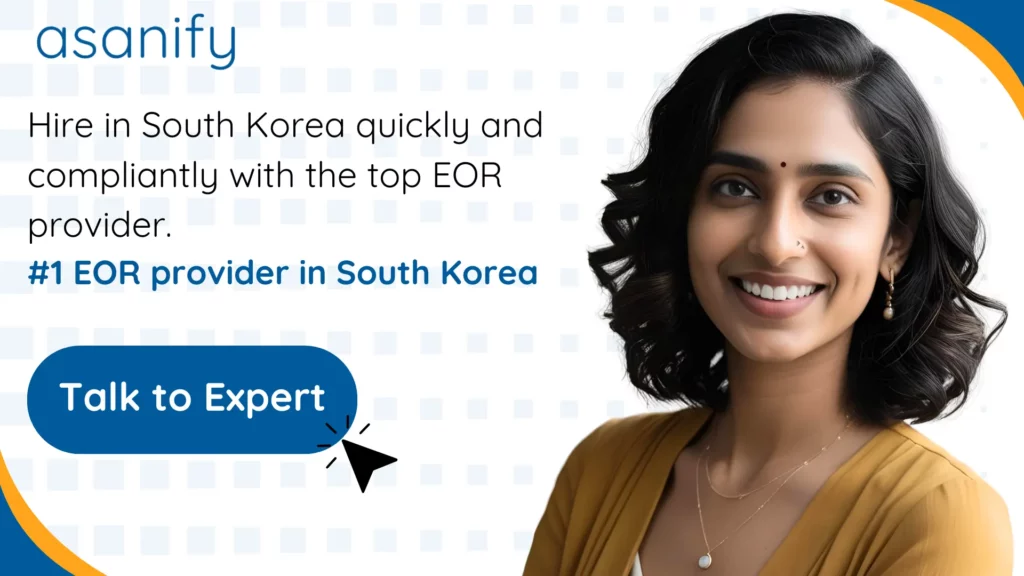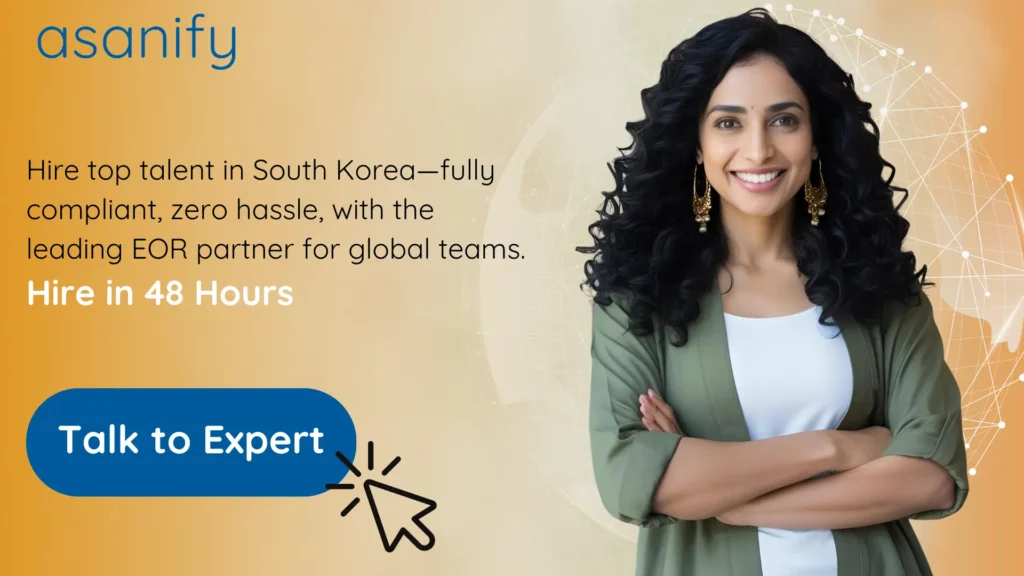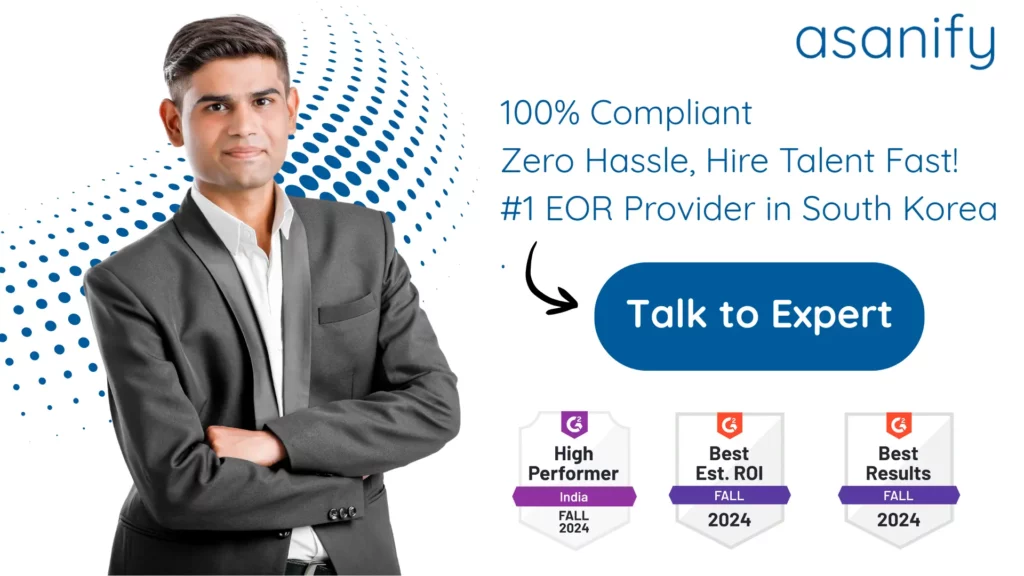Expanding your business into South Korea offers access to one of Asia’s most technologically advanced economies and a global hub for innovation, manufacturing, and trade. However, before hiring in South Korea, employers must understand the country’s structured work visa and immigration process. Securing the correct visa and work authorization for non-Korean employees is essential to staying compliant with national regulations and ensuring a smooth onboarding process.
Navigating these requirements can be complex, as they vary depending on the employee’s nationality, job type, qualifications, and visa category. Employers must ensure all documentation is accurately prepared, translated if necessary, and submitted within the required timelines. Partnering with experienced immigration specialists or an Employer of Record (EOR) can greatly simplify the process, reduce compliance risks, and help businesses onboard talent quickly and legally.
Table of Contents
- Overview of South Korea’s Work Permit and Visa System
- Understanding Requirements and Eligibility
- Who Needs a Work Visa in South Korea
- Employer and Employee Eligibility
- Types of Work Visas in South Korea
- Advantages of the E-7 Visa
- Application Process for Employers
- Required Documents
- Processing Timelines
- Employer Responsibilities and Compliance
- Tips for a Smooth Application Process
- How an Employer of Record Can Help
- How Asanify Can Help
- FAQs
Overview of South Korea’s Work Permit and Visa System
South Korea regulates foreign employment through a visa-based system, with different visa categories for various job types and skill levels. The process depends on the applicant’s qualifications, job role, and intended duration of stay, and is designed to attract skilled professionals while safeguarding local labor market priorities. Applicants must meet specific eligibility criteria for their visa category, and in many cases, employers are required to obtain prior approval from the Ministry of Justice before the visa application can proceed.
- Korean citizens – No permit or visa required.
- Foreign nationals – Must secure an appropriate work visa before starting employment.
- Multiple visa types – Such as E-series visas for professionals, skilled workers, and specific industries.
- Employer-driven process – Employers usually initiate the application by obtaining approval from the Ministry of Justice.
- Two-step process – Apply for visa issuance approval in South Korea, then have the employee apply for the visa at a Korean embassy or consulate.

Understanding Requirements and Eligibility
Before starting the application, both employers and employees must understand South Korea’s visa regulations. Requirements vary depending on the visa type and industry.
- Certain visas, such as the E-7 Special Occupation Visa, require proof of specialized skills, qualifications, or industry experience.
- Employers may need to demonstrate that the position cannot be easily filled by a Korean national.
- Some professions, like healthcare or legal services, require additional licensing or recognition from relevant Korean authorities before a visa can be approved.
Who Needs a Work Visa in South Korea
All non-Korean nationals require a valid work visa to be employed in the country. Short-term business trips may be covered by a C-3 visa, but formal employment always requires a long-term work visa such as E-7 or E-1.
- Work visas are tied to a specific employer and job role, meaning a new application or transfer process is needed if changing jobs.
- Long-term work visas typically allow dependents to join under an F-3 dependent visa, subject to eligibility.
- Visa holders must apply for an Alien Registration Card (ARC) within 90 days of arrival to legally reside and work in South Korea.
Key Conditions for Obtaining a Work Visa
To qualify for a South Korean work visa, applicants generally must:
- Have a confirmed job offer from a Korea-registered employer.
- Possess the qualifications, degrees, or licenses relevant to the position.
- Pass any industry-specific eligibility requirements.
- Have a clean criminal record.
- Be medically fit to work.
Employer and Employee Eligibility
Employers must be registered to hire foreign staff and comply with government quotas or approval processes. Employees must meet education and experience criteria for their visa category, which can differ significantly by role.
- Employers must maintain good standing with the Ministry of Justice and other relevant authorities to retain hiring eligibility.
- Certain industries may have stricter quotas or higher qualification requirements for foreign hires.
- Both employer and employee documentation is reviewed during the visa process to ensure compliance with South Korean labor and immigration laws.
Suggested Read: Understanding Labour Laws in South Korea in 2025
Types of Work Visas in South Korea
- E-1 Professor Visa – For university-level teaching staff.
- E-2 Foreign Language Instructor Visa – For qualified language teachers.
- E-3 Research Visa – For researchers in government-approved projects.
- E-5 Professional Visa – For licensed professionals such as lawyers and doctors.
- E-7 Special Occupation Visa – For skilled workers in approved industries.
Comparing Work Visa Types
| Visa Type | Purpose | Duration | Notes |
| E-1 | Professors/lecturers | 1 year | Renewable; requires university contract |
| E-2 | Language instructors | 1 year | Background checks and health exams required |
| E-3 | Research roles | 1–2 years | Must be tied to approved institution |
| E-5 | Licensed professionals | 1–3 years | Requires Korean licensing recognition |
| E-7 | Skilled occupations | 1–3 years | Based on Ministry of Justice list of roles |

Advantages of the E-7 Visa
The E-7 Visa covers a wide range of specialized occupations, offering flexibility for employers to hire talent in industries like IT, engineering, and manufacturing. It is renewable and allows dependent visas for family members.
- Employers can recruit professionals with niche skills that are in high demand but scarce in the local labor market.
- The visa duration typically ranges from 1 to 3 years, with the possibility of extension based on continued employment.
- Dependent visa holders (F-3) can reside in South Korea for the same duration as the principal E-7 visa holder.
Application Process for Employers
- Employer applies for visa issuance approval with the Ministry of Justice.
- Approval document is issued and sent to the foreign employee.
- Employee applies for the visa at a Korean embassy or consulate using the approval document.
- Arrival in South Korea – Employee registers for an Alien Registration Card (ARC) within 90 days.
Required Documents
- Completed visa application form.
- Valid passport and recent passport-sized photos.
- Employment contract.
- Degree or qualification certificates.
- Criminal background check.
- Health examination report (for certain visas).
- Visa issuance approval number from the Ministry of Justice.
Processing Timelines
Work visa processing in South Korea generally takes 5–10 weeks from job offer to legal work authorization, depending on the visa type, the applicant’s profession, and the completeness of the application. Certain visas, such as the E-7 Special Occupation Visa, may take longer due to additional documentation or industry-specific approvals.
- Processing timelines may vary based on the applicant’s nationality, qualifications, and the visa category.
- Incomplete, incorrect, or untranslated documents can lead to significant delays in approval.
- Sectors like education, healthcare, and engineering may require extra licensing or verification steps, extending processing times.
- Close coordination between the employer, the Ministry of Justice, and the employee is critical to ensure no gaps in documentation.
- Engaging an Employer of Record or an immigration specialist can help ensure accurate submissions and faster approvals.
Employer Responsibilities and Compliance
Employers hiring foreign workers in South Korea must:
- Provide contracts that meet Korean labor law standards.
- Pay salaries meeting minimum thresholds for the visa type.
- Keep accurate employment and visa records.
- Renew visas and ARCs before expiry.
Legal Obligations
- Report new hires and terminations to immigration authorities.
- Comply with industry-specific foreign worker quotas.
- Maintain updated business registration and licensing.
Consequences of Non-Compliance
- Heavy fines and administrative sanctions.
- Loss of right to hire foreign workers.
- Deportation of the employee.
Maintaining Ongoing Compliance
- Monitor visa and ARC expiry dates.
- Conduct internal compliance audits.
- Stay updated on immigration policy changes.

Tips for a Smooth Application Process
- Start the application early to account for document verification and approvals.
- Ensure all foreign documents are translated into Korean and notarized if required.
- Maintain direct communication with immigration authorities.
- Consider using an Employer of Record services to simplify compliance.
How an Employer of Record Can Help
Partnering with an Employer of Record in South Korea allows companies to legally employ foreign talent without the need to establish a local legal entity. The EOR acts as the official employer, managing payroll, benefits, HR compliance, and immigration processes, including work visa and Alien Registration Card (ARC) applications. This approach reduces administrative burdens, accelerates hiring timelines, and ensures full compliance with South Korean labor and immigration regulations.
Additionally, EOR providers prepare employment contracts that comply with Korean labor laws, minimizing the risk of legal disputes. They also manage the complete visa process—from obtaining visa issuance approval to coordinating ARC registration—ensuring a smooth onboarding experience for international employees. By leveraging an EOR, businesses can focus on operations and growth while leaving complex employment compliance to trusted local experts.
Suggested Read: Remote Employees Onboarding Checklist with EOR in South Korea
How Asanify Can Help
Navigating South Korea’s work visa and immigration process can be complex, especially for businesses hiring international talent. Asanify offers a comprehensive Employer of Record (EOR) solution that streamlines hiring and workforce management in South Korea.
Our services cover everything from securing the correct work visas such as the E-7 Special Occupation Visa—to managing payroll, benefits, and compliance, ensuring you remain fully aligned with South Korean labor and immigration laws without the need to set up a local entity.
With Asanify, you can:
- Hire and onboard foreign talent quickly without administrative delays.
- Ensure compliance with all national labor and immigration regulations.
- Expand into South Korea without the cost and complexity of establishing a local company.
If your objective is to grow your team in South Korea efficiently, Asanify’s expertise and end-to-end services make the process smooth, compliant, and hassle-free.
FAQs
Most visas are valid for 1–3 years, depending on type, and are renewable.
Fees vary by visa category and embassy, typically USD $50–150.
Yes, but they must obtain approval from immigration and update their ARC.
Yes, dependents can apply for an F-3 visa.
Yes, foreign documents must be translated into Korean and notarized.
An EOR ensures compliance, manages the visa process, and eliminates the need for a local legal entity.
Not to be considered as tax, legal, financial or HR advice. Regulations change over time so please consult a lawyer, accountant or Labour Law expert for specific guidance.

